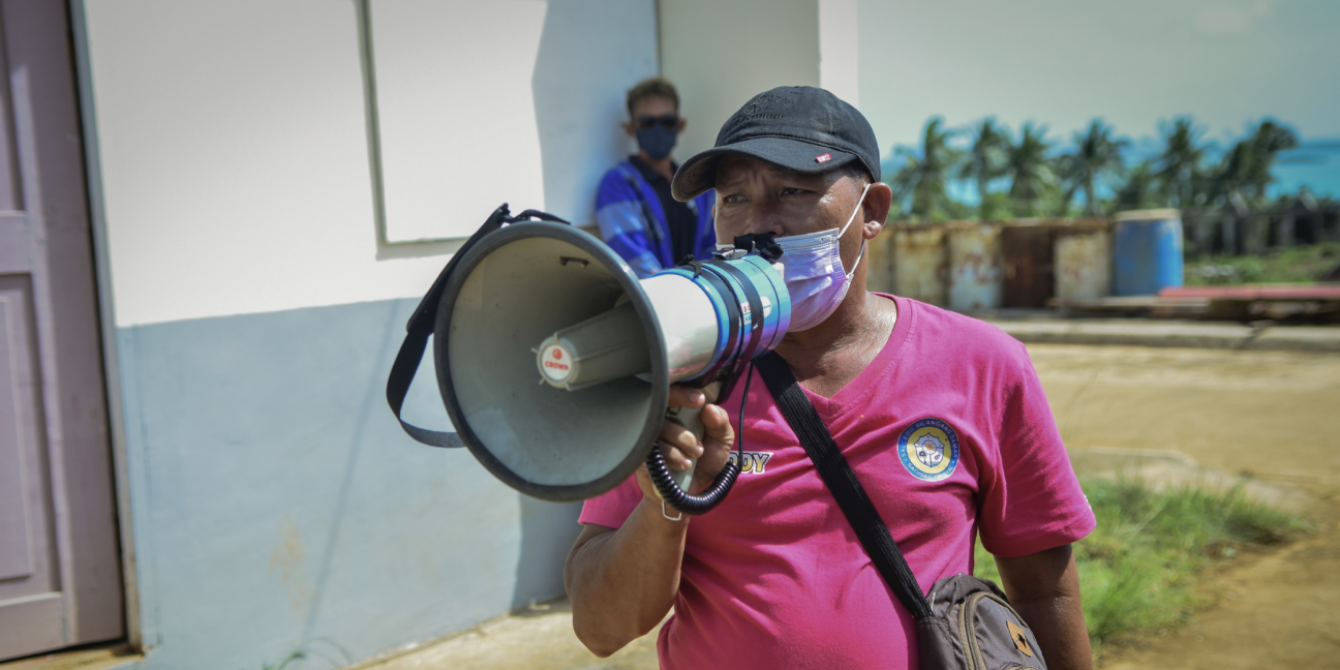Oxfam’s pre-disaster aid strengthens community’s disaster preparedness

Brgy. Chairman Sentino Uy, 48, secured the safety of his constituents who evacuated in Brgy. Palanas, Salcedo, E. Samar. (Photo: Alren Beronio/Oxfam)
Severgillo Abellar is a village councilor of Buabua in Salcedo town, Eastern Samar province. He is also one of the many people included in the Building Resilient, Adaptive, and Disaster Ready Communities (B-READY) project of Oxfam Pilipinas and its partners.
The B-READY project combines weather forecasting and pre-disaster cash transfer to empower communities to protect themselves before typhoons. The pre-disaster assistance is extended to the most vulnerable members of the community when the forecast indicates that the impacts of the typhoon will be at the pre-defined threshold.
Severgillo works as a tricycle driver and earns around P400 daily. He also receives P4,500 monthly honorarium as a village councilor.
He admitted his income is insufficient, given that all his four children are in school—one is in college, two are high school students, and the youngest is in elementary.
When super typhoon 'Odette' (international name: Rai) was predicted to affect Salcedo, the 47-year-old father received P1,700 and bought five kilograms of rice, canned goods, noodles, and even paracetamol as they took shelter in an evacuation center.
Abellar said the B-READY project's financial aid was a big help to them.
“For us, the money is not only meant to buy essentials like food. It is also life-saving as it helps us sustain for at least three days while we wait for help from the government,” he said.
The Buabua village chairperson, Donato Ecle, said he is grateful that at least 61 of his constituents were recipients of the pre-disaster aid.
Buabua is a coastal village affected by the deadly storm surge brought by Super Typhoon 'Yolanda' (international name: Haiyan) in 2013.
The majority of the village residents depend on copra production sourced from coconut trees. When Yolanda destroyed all their coconut trees, life became more difficult for its population.
“Most of our people are poor, and this was worsened when we were hit by Yolanda since practically all our coconut trees were toppled down,” Ecle said.
According to Ecle, the B-READY project helped the community readily follow instructions to evacuate since they already have the needed provisions that sustain them for at least three days after a storm strikes their village.
In addition, Ecle said that the project of Oxfam and its partners gave barangay leaders more time to work on other disaster preparedness activities since the project already eased the need to prepare food aid for the community.
"We can focus more, for example, on educating our constituents on what to do or where to go when the typhoon comes, instead of just preparing food packs,” Ecle said.
The Buabua village chairperson hopes a similar program will be implemented by the national government, given its benefits to the communities.
On evacuation
Sentino Uy, Palanas village chairperson in Salcedo, shared the same sentiment.
Uy, 48, commends the anticipatory cash aid of the B-READY project. He also agreed with Ecle's statement that communities will feel at ease to go to evacuation centers if they have food to eat.
“It will be easy for us barangay officials to persuade our constituents to leave their houses and go to the evacuation center if they have money to buy their foods for at least three days,” Sentino said.
When news arrived about Salcedo being likely to be affected by super typhoon Odette, more than 80 families voluntarily abandoned their houses. They sought temporary shelter at a government-funded housing project, about a kilometer away from the village center.
Besides Buabua and Palanas, a total of 7,828 barangays throughout the country were affected by super typhoon Odette. At least 538,000 people are staying in 1,503 evacuation centers while 190,000 people are staying with relatives and/or friends.
Aside from the anticipatory project in Eastern Samar, Oxfam and partners provided immediate life-saving support to address water, sanitation, and hygiene assistance, food, and shelter needs to families in Palawan, Leyte and Southern Leyte, and Siargao Island in Surigao del Norte Province.

 Follow us on Facebook
Follow us on Facebook Instagram
Instagram Follow us on Twitter
Follow us on Twitter LinkedIn
LinkedIn